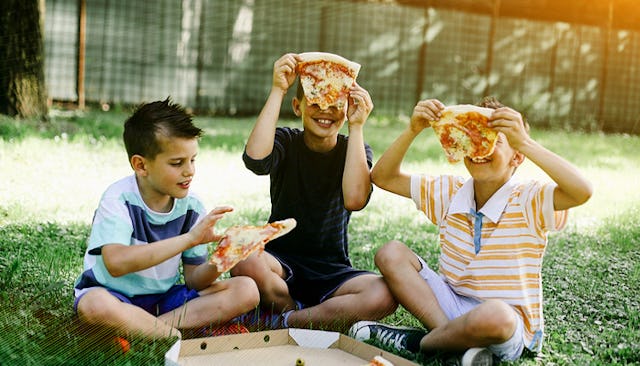It's Time To Stop Celebrating Everything With Food

I grew up in the rural Midwest, America’s heartland, where every occasion is marked with a meal. New baby? You get cakes and casseroles. A death in the family? Same, with a few meat-and-cheese trays thrown in. Graduations, birthday parties, housewarming celebrations, holidays — hell, weekends — are cause for the cooking and sharing of army-sized quantities of food, seasoned with a hearty helping of laughter and togetherness.
It was my grandma’s love language, cooking for the people she cared about. She wasn’t a hugger; instead, she’d greet guests with, “Are you hungry?” And even if you weren’t, you knew better than to refuse her offering, whether it was fresh-baked cookies or a four-course meal — mainly because that would’ve been the same as refusing a gesture of love. But also because her cooking was freaking delicious. Some grandmothers show they care with snuggles and kisses. Mine showed me via a belly full of homemade goulash or lasagna or whatever I happened to crave, and it was glorious.
As a result of all this, I grew up associating food with comfort and warmth and security and celebration. And though I don’t think that’s entirely a bad thing — I mean, some of the best memories are made around a dinner table, no matter what culture you’re from — it comes with a high price. Because when you associate food with good feelings, you tend to overdo it in the pursuit of those feelings, especially when times are tough.
I’m an emotional eater, turning to the fridge whether I’m stressed or sad or bored or thrilled, and have consequently (and consistently) struggled with my weight. It’s not fun, and if anyone were to ask me if that’s a legacy I’d like to pass on to my kids, I would answer with a resounding hell no. Yet there’s one problem: That’s exactly what I’m doing.
My husband comes from a similar background, so neither of us think twice when we take the kids out for pizza to celebrate good grades or revolve “family fun night” around what special snacks we’re going to have. Birthday party planning starts with, “What kind of cake and ice cream do you want?” and no trip to the movie theater is complete without a big, buttery bucket of their greasiest popcorn.
Our intentions, like those of our parents and grandparents, are completely good. And there is a time and place for snacks and treats, so I won’t make them forgo their movie popcorn, but our family rituals are inadvertently creating an environment that is going to instill in our children the same food-centric mindset that we’ve both wished we could overcome. We’re setting them up to use food as a crutch, the way we tend to do. Despite having roots in love and nourishment, it has cast a dark cloud over my health and self-esteem as an adult, and I don’t want that for my kids.
There’s still time to show them that they can celebrate a big win or mourn a big loss by taking a family hike, or going for a bike ride, or shifting the focus from the goodies to the games. It’s going to take a monumental effort on my part because it’s still my (deeply ingrained) first inclination to eat my feelings — no matter what those feelings are. But I’m trying to break the cycle for the sake of my children who will have enough to deal with as adults without adding extra pressure to reform the lifestyle they grew up with.
Because they need to know that the pathway to happiness and contentment is not paved with potato chips.
This article was originally published on